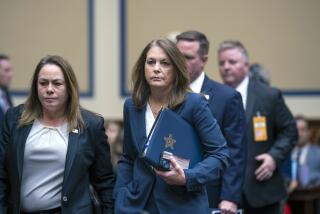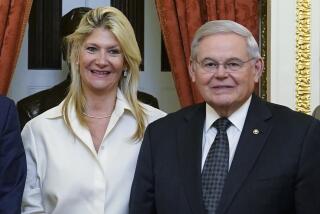Riegle Disputes Earlier Testimony on Keating : Thrifts: He denies he arranged a meeting between senators, regulators. He also says he did not seek funds in a visit to the executive.
- Share via
WASHINGTON — Under tough cross-examination Monday, Sen. Donald W. Riegle Jr. (D-Mich.) directly contradicted testimony that he had arranged a meeting of senators with federal regulators on behalf of savings and loan executive Charles H. Keating Jr.
He also denied that he had sought campaign funds in a 1987 visit to Keating’s Arizona headquarters, as alleged in earlier documents presented to the Senate Ethics Committee.
Riegle told the committee that “there was not any fund-raising activity in that time or that place,” referring to a visit to the offices of Keating’s American Continental Corp. in Phoenix. He claimed that he had never seen a memo by his top aide saying that he would get $10,000 in contributions at American Continental.
Riegle challenged the sworn testimony of Keating’s lobbyist, James Grogan, who told the committee last month that Riegle promised to assemble a gathering of senators and federal regulators to discuss the problems of now failed Lincoln Savings & Loan, which was controlled by Keating.
But Riegle testified Monday, “I don’t recall such a conversation taking place,” leaving the Ethics Committee the choice of deciding whether to believe him or Grogan.
Riegle was the third senator to undergo cross-examination at the Ethics Committee, which is trying to determine whether five senators, including Alan Cranston (D-Calif.), acted improperly in dealings with federal regulators on behalf of Keating’s Lincoln S&L.; Keating gave $1.3 million to the senators’ campaigns and political causes. Lincoln collapsed in 1989, and its seizure by the government will cost the taxpayers $2 billion--the biggest single failure in the S&L; crisis.
At the heart of the controversy is the propriety of senatorial action at two meetings, on April 2 and April 9, 1987, to discuss Lincoln’s financial problems and the long-running financial examination by federal regulators.
When Grogan testified in December, committee special counsel Robert S. Bennett asked him: “Is there any doubt in your mind that Sen. Riegle arranged the (April 2) meeting with the senators?”
Grogan responded: “No, sir.”
Keating believed that federal regulators were persecuting Lincoln and was anxious to get members of Congress to intervene, according to Grogan, who testified under a grant of immunity. Grogan testified that Riegle, during his March, 1987, visit to American Continental, promised to arrange a meeting with S&L; regulators. “That was a very significant point for us,” Grogan testified.
Riegle said Monday that “something was misconstrued somewhere along the line,” referring to Grogan’s version of the visit.
Citing the pressure of thousands of meetings in a busy senatorial career, Riegle frequently said that he could not recall many of the key events or conversations surrounding the committee investigation.
Bennett led Riegle through a long list of entries from the Michigan senator’s office calendar referring to scheduled meetings with Keating or Grogan. Riegle was unable to recall any details.
Riegle did not attend the April 2 meeting between senators and regulators, and said he went to the April 9 session solely as an expert “resource person,” because he was a Senate Banking, Housing and Urban Affairs Committee member.
Riegle said that he visited Phoenix in March, 1987, to attend fund-raising events sponsored by New England Life, an insurance company, and by Jewish community groups.
Officials of Keating’s company “asked me to go by and see the size and scope of their business,” Riegle said.
However, a memo prepared by Kevin Gottlieb, former top aide to Riegle, said that the Arizona trip would raise $27,000, including the listing, “$10,000 American Continental.” Riegle said that he had never seen the memo until the Ethics Committee sent him a copy of it.
A separate schedule prepared for Riegle’s trip also had this entry for March 8: “Earl Katz plans to take you to American Continental Corp. for an informal meeting of the principals there. No discussion of money. Earl will collect what needs to be collected later.”
Riegle said that this document was a draft schedule and not the actual schedule.
Earl Katz, a prominent Arizona political fund-raiser who drove Riegle to the American Continental offices, previously told the committee that Riegle would have known that money was going to be collected for him.
Sens. John McCain (R-Ariz.) and John Glenn (D-Ohio) were cross-examined by Bennett and Ethics Committee members on last Friday. The two members of the so-called “Keating Five” remaining to be questioned are Sens. Dennis DeConcini (D-Ariz.) and Cranston.
More to Read
Get the L.A. Times Politics newsletter
Deeply reported insights into legislation, politics and policy from Sacramento, Washington and beyond. In your inbox twice per week.
You may occasionally receive promotional content from the Los Angeles Times.









